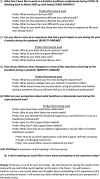Sprinting in a Marathon: Nursing Staff and Nurse Leaders Make Meaning of Practicing in COVID-19 Devoted Units Pre-Vaccine
- PMID: 37008557
- PMCID: PMC10052614
- DOI: 10.1177/23779608231165688
Sprinting in a Marathon: Nursing Staff and Nurse Leaders Make Meaning of Practicing in COVID-19 Devoted Units Pre-Vaccine
Abstract
Objective: To describe the lived experience of nursing staff and nurse leaders working in COVID-19 devoted units (intensive care or medical unit) prior to vaccine availability.
Research design: Qualitative phenomenological design with a focus group approach.
Methods: The study team recruited a convenience sample of nursing staff (nurses, and nursing assistants/nurse technicians) and nurse leaders (managers, assistant nurse managers, clinical nurse specialists, and nurse educators) at an academic medical center in the midwestern United States. Focus groups and individual interviews were conducted to encourage participants to describe their (1) experiences as nursing professionals, (2) coping strategies, and (3) perspectives about supportive resources. Moral distress was measured with the moral distress thermometer and qualitative data were analyzed with Giorgi-style phenomenology.
Results: We conducted 10 in-person focus groups and five one-on-one interviews (n = 44). Seven themes emerged: (1) the reality of COVID-19: we are sprinting in a marathon; (2) acute/critical care nurse leaders experience unique burdens; (3) acute/critical care staff nurses experience unique burdens; (4) meaning of our lived experience; (5) what helped us during the pandemic; (6) what hurt us during the pandemic; and (7) we are not okay. Participants reported a moderate level of moral distress (M = 5.26 SD = 2.31). They emphasized that peer support was preferred over other types of support offered by the healthcare organization. Participants expressed positive feedback about the focus group experience and commented that group processing validated their experiences and helped them "feel heard."
Conclusion: These findings affirm the need for trauma-informed care and grief support for nurses, interventions that increase meaning in work, and efforts to enhance primary palliative communication skills. Study findings can inform efforts to tailor existing interventions and develop new, more comprehensive resources to meet the psychosocial needs of nursing staff and nurse leaders practicing during a pandemic.
Keywords: COVID-19; adaptation; grief; intensive care units; leadership; nurses; psychological; psychological distress.
© The Author(s) 2023.
Conflict of interest statement
The author(s) declared no potential conflicts of interest with respect to the research, authorship, and/or publication of this article.
Figures
Similar articles
-
Compassion fatigue, moral distress, and work engagement in surgical intensive care unit trauma nurses: a pilot study.Dimens Crit Care Nurs. 2014 Jul-Aug;33(4):215-25. doi: 10.1097/DCC.0000000000000056. Dimens Crit Care Nurs. 2014. PMID: 24895952
-
Ethical challenges causing moral distress: nursing home staff's experiences of working during the COVID-19 pandemic.Scand J Prim Health Care. 2024 Jun;42(2):266-275. doi: 10.1080/02813432.2024.2308573. Epub 2024 Feb 9. Scand J Prim Health Care. 2024. PMID: 38334427 Free PMC article.
-
A Phenomenological Study of Nurse Managers' and Assistant Nurse Managers' Experiences during the COVID-19 Pandemic in the United States.J Nurs Manag. 2021 Sep;29(6):1525-1534. doi: 10.1111/jonm.13304. Epub 2021 Mar 22. J Nurs Manag. 2021. PMID: 33690928 Free PMC article.
-
Strategies and resources for nurse leaders to use to lead with empathy and prudence so they understand and address sources of anxiety among nurses practising in the era of COVID-19.J Clin Nurs. 2021 Jan;30(1-2):298-305. doi: 10.1111/jocn.15520. Epub 2020 Oct 15. J Clin Nurs. 2021. PMID: 33006794 Free PMC article. Review.
-
Barriers and facilitators to the implementation of doctor-nurse substitution strategies in primary care: a qualitative evidence synthesis.Cochrane Database Syst Rev. 2019 Apr 15;4(4):CD010412. doi: 10.1002/14651858.CD010412.pub2. Cochrane Database Syst Rev. 2019. PMID: 30982950 Free PMC article.
Cited by
-
Impact of restricted family presence during the COVID-19 pandemic on critically ill patients, families, and critical care clinicians: a qualitative systematic review.BMC Health Serv Res. 2024 Aug 15;24(1):936. doi: 10.1186/s12913-024-11398-x. BMC Health Serv Res. 2024. PMID: 39148067 Free PMC article.
-
Delirium in the United States: Results From the 2023 Cross-Sectional World Delirium Awareness Day Prevalence Study.J Acad Consult Liaison Psychiatry. 2024 Sep-Oct;65(5):417-430. doi: 10.1016/j.jaclp.2024.06.005. Epub 2024 Jun 27. J Acad Consult Liaison Psychiatry. 2024. PMID: 38944277 Free PMC article.
References
-
- Advisory Board (2020). Three strategies to build baseline emotional support (pp. 3–11). Advisory Board. https://www.advisory.com/research/nursing-executive-center/resources/202...
-
- American Association of Critical-Care Nurses (2020). Moral distress in times of crisis. https://www.aacn.org/nursing-excellence/healthy-work-environments/∼/medi....
-
- Arabi Y. M., Azoulay E., Al-Dorzi H. M., Phua J., Salluh J., Binnie A., Hodgson C., Angus D. C., Cecconi M., Du B., Fowler R., Gomersall C. D., Horby P., Juffermans N. P., Kesecioglu J., Kleinpell R. M., Machado F. R., Martin G. S., Meyfroidt G., Citerio G. (2021). How the COVID-19 pandemic will change the future of critical care. Intensive Care Medicine, 47(3), 282–291. 10.1007/s00134-021-06352-y - DOI - PMC - PubMed
-
- Breitbart W. (2016). Meaning-Centered Psychotherapy in the cancer setting: Finding meaning and hope in the face of suffering. In Meaning-Centered Psychotherapy in the Cancer Setting. Oxford University Press. https://oxfordmedicine.com/view/10.1093/med/9780199837229.001.0001/med-9... - DOI
Grants and funding
LinkOut - more resources
Full Text Sources


